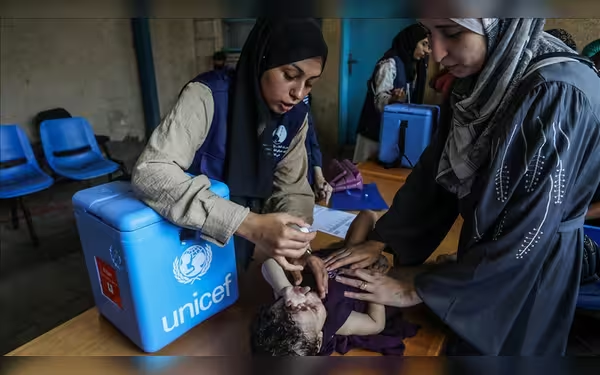Saturday, November 16, 2024 07:26 PM
UNICEF Launches Second Round of Polio Vaccinations in Gaza
- Second round of polio vaccinations starts on October 14.
- UNICEF aims to vaccinate 590,000 children under ten.
- Humanitarian pauses are essential for vaccination efforts.
 Image Credits: thefrontierpost
Image Credits: thefrontierpostUNICEF announces second round of polio vaccinations in Gaza starting October 14, targeting 590,000 children amid ongoing health crisis.
The ongoing health crisis in Gaza has drawn significant international attention, particularly concerning the resurgence of polio. The United Nations Children’s Fund (UNICEF) has announced that a second round of polio vaccinations will commence on October 14, aiming to protect approximately 590,000 children under the age of ten. This initiative is crucial, especially in light of the recent reports of polio cases in the region, which highlight the urgent need for vaccination to prevent further outbreaks.
UNICEF Executive Director Catherine Russell confirmed the vaccination schedule on social media platform X, stating, "The second round of polio vaccination in the Gaza Strip is confirmed. It will start on 14 October to vaccinate around 590K children under 10." This announcement comes as part of a broader effort to combat the spread of polio, a disease that can lead to paralysis and even death if not addressed promptly.
In her statement, Russell emphasized the importance of humanitarian pauses in the ongoing conflict, saying, "Without them, it is impossible to vaccinate the children." These pauses are essential to ensure that health workers can safely reach children in need of vaccinations. The dire conditions in Gaza, exacerbated by ongoing violence, have made it increasingly challenging to deliver healthcare services.
In addition to the polio vaccine, UNICEF plans to provide vitamin A supplements to bolster the immune systems of children in Gaza. Russell noted that "children in Gaza live in extremely dire hygiene and sanitation conditions," which further complicates their health situation. The provision of these supplements is a vital step in ensuring that children are not only vaccinated but also have the necessary nutrients to fight off infections.
UNICEF has received additional vaccine equipment and cold boxes, which are crucial for maintaining the integrity of the vaccines during transport and storage. Russell remarked, "With the additional vaccine equipment and cold boxes that arrived yesterday, UNICEF is ready to deliver and vaccinate children to stop the transmission of polio." This readiness is a positive sign, indicating that the organization is prepared to act swiftly to protect the health of children in the region.
The first round of vaccinations, which took place in September, achieved a commendable coverage rate of 90%. This success demonstrates that when agreements are respected, effective health interventions can be implemented. The collaboration between UNICEF, the World Health Organization (WHO), the Palestinian Health Ministry, and the UN agency for Palestinian refugees (UNRWA) has been instrumental in launching this vaccination campaign.
As the second round of vaccinations approaches, it is imperative for all parties involved to prioritize the health and safety of children in Gaza. The fight against polio is not just a health issue; it is a humanitarian imperative. Ensuring that every child receives the necessary vaccinations can help pave the way for a healthier future, free from the threat of preventable diseases. The world must remain vigilant and supportive of these efforts, as the health of the youngest and most vulnerable members of society hangs in the balance.













